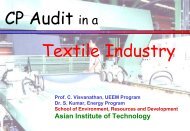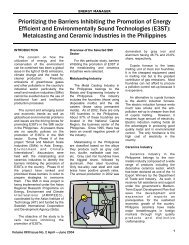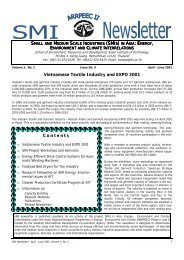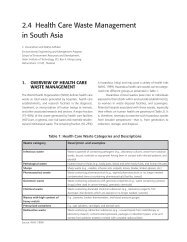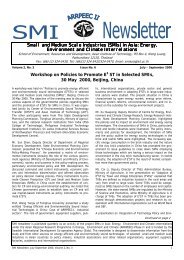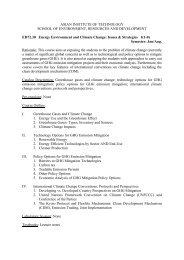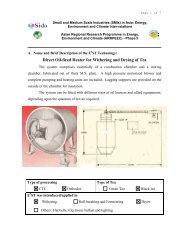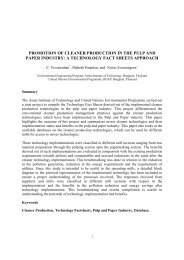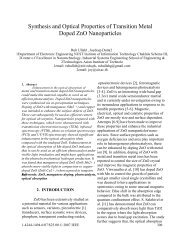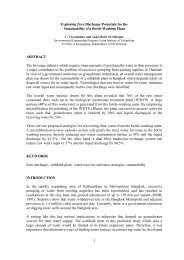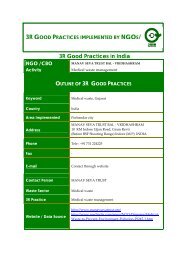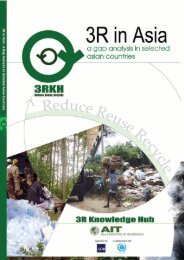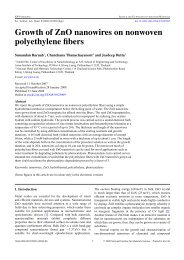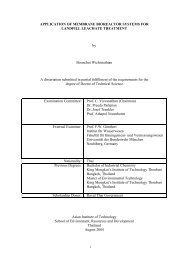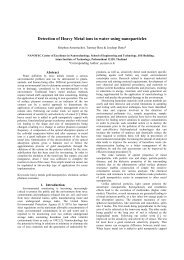Evaluation of Plastic Waste Management in Thailand Using Material ...
Evaluation of Plastic Waste Management in Thailand Using Material ...
Evaluation of Plastic Waste Management in Thailand Using Material ...
You also want an ePaper? Increase the reach of your titles
YUMPU automatically turns print PDFs into web optimized ePapers that Google loves.
<strong>Plastic</strong> wastes are mostly recycled <strong>in</strong>to pelletiz<strong>in</strong>g as raw materials for plastic manufactures<br />
(e.g. PET, PP, PE) because they make money and require low <strong>in</strong>vestment costs. There are<br />
many oil recovery plants that use landfilled plastic wastes to produce fuel oil for vehicles<br />
(PE and PP waste). These recycl<strong>in</strong>g are not suitable to solve the impacts from plastic<br />
wastes because the recycled products require post-treatment, and the recycl<strong>in</strong>g process also<br />
releases much pollution. Therefore, feasible technologies and policies for plastic recycl<strong>in</strong>g<br />
have to be carried out for the future plann<strong>in</strong>g works <strong>of</strong> plastic waste management.<br />
This study aims to identify and quantify the material flow <strong>of</strong> plastics <strong>in</strong> <strong>Thailand</strong>. The clear<br />
representation <strong>of</strong> various processes and flows <strong>of</strong> plastic waste gives an account <strong>of</strong> which<br />
particular sub-processes to be focused <strong>in</strong> terms <strong>of</strong> mak<strong>in</strong>g a management decision to<br />
improve overall plastic waste management. The current situation and issues <strong>of</strong> plastic<br />
waste management problems and possibilities <strong>of</strong> improvement <strong>in</strong> plastic recycl<strong>in</strong>g and<br />
recovery had been analyzed from the perspectives and suggestions from the relevant<br />
stakeholders. F<strong>in</strong>ally, the scenarios <strong>of</strong> plastic waste management are proposed through<br />
improved recycl<strong>in</strong>g rate by appropriate technology, policy, and f<strong>in</strong>ancial measures.<br />
1.2 Objectives <strong>of</strong> Study<br />
The objectives <strong>of</strong> this study are:<br />
1.2.1 To identify and quantify the stocks and flows <strong>of</strong> plastic <strong>in</strong> <strong>Thailand</strong>, and present the<br />
overview <strong>of</strong> exist<strong>in</strong>g status <strong>of</strong> plastic waste management <strong>in</strong> <strong>Thailand</strong><br />
1.2.2 To analyze the roles, responsibilities and characteristics <strong>of</strong> relevant stakeholders<br />
and their contribution <strong>in</strong> plastic waste management.<br />
1.2.3 To propose the priority scenarios <strong>of</strong> plastic waste management based on the<br />
material flow and stakeholder analysis.<br />
1.3 Scope and Limitations <strong>of</strong> the Study<br />
This study illustrates the status <strong>of</strong> plastic waste generation and management practices <strong>in</strong><br />
<strong>Thailand</strong>, however, consider<strong>in</strong>g the practicalities the field visits Bangkok Metropolitan<br />
Adm<strong>in</strong>istration (BMA) has been chosen for field visits. Case <strong>of</strong> BMA is also important<br />
because the metropolitan areas like BMA typically generates more volume <strong>of</strong> plastic<br />
wastes, and has many <strong>of</strong> the plastic recycl<strong>in</strong>g activities (junk shops, waste banks, recycl<strong>in</strong>g<br />
units-both formal and <strong>in</strong>formal sectors), occurr<strong>in</strong>g with<strong>in</strong> its jurisdiction. Methods <strong>of</strong> the<br />
study <strong>in</strong>volved secondary research, and primary data collection through field visits and<br />
<strong>in</strong>terview with relevant stakeholders as <strong>in</strong> plastic manufacturers, <strong>in</strong>formal and formal<br />
waste shops, plastic recycl<strong>in</strong>g facilities, as well as consumers, policymakers, <strong>of</strong>ficials from<br />
BMA <strong>of</strong>fice, and other related government organizations, private <strong>in</strong>stitutions and<br />
associations. The quantification <strong>of</strong> plastic flow and stock is based on the material flow<br />
analysis (MFA) result, which considered a set <strong>of</strong> assumptions and a system boundary.<br />
2



